Brief Postal History of St.Settlements
Postage Stamps and Brief Postal History of the Straits Settlements
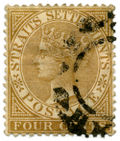
1883, 4c
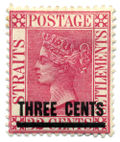
Overprint of 1894, 3 cents on 32 cents
The Straits Settlements have a distinct postal history from the other Malayan areas. By the 1800s, mail was handled privately by passing ships and the earliest known postal marking is dated around 1806 by a post office on the Prince of Wales island. By 1837, the postal service was regulated under the Indian Post Office Act and postage stamps from India were used from 1854.
Cancellations used were ‘B109’ at Malacca, ‘B147’ at Penang and ‘B172’ at Singapore.
As a Crown Colony in 1867, the Settlements issued their own stamps.
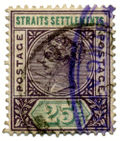
1892 25c "key plate"
Records indicate that from September 1867, existing Indian postage stamps were overprinted with a crown and a new value in cents. Gradually, the new issue of nine stamps printed by De La Rue appeared with the 30c value issued in 1872. Postage stamps shortages forced new surcharges on existing stock until the arrival of the new 5c and 10c stamps in January 1882. However, additional surcharges did appear regularly until the end of the century.
The accession of King Edward the Seventh necessitated a new issue in 1902, supplemented in 1903 with different designs. In 1910, new large stamps appeared with values of $25 and $500, but were used for fiscal purposes.
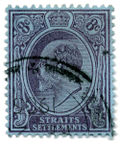
1904 8c, used in 1906
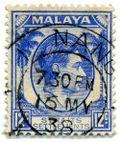
12c, 1938, used at Penang
George the Fifth’s portrait appeared on a new isue in 1912 with earlier frames. They were overprinted in 1922 for the Malaya-Borneo Exhibition.
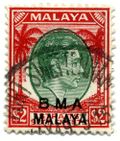
2-dollar value used at Port Swettenham (now Port Klang) in 1949
The last issue of the Settlements was for King George the Sixth beginning in 1937. In March 1942, the Japanese Occupation used existing stamps overprinted with Japanese inscriptions. After their withdrawal in 1945, the British Military Administration issued provisional issues by overprinting ‘BMA / MALAYA’ on Strait Settlements stamps. These were available until regular postage stamps were organised.